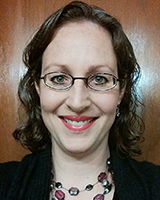Stefanie A.G. Black, PhD

Postdoctoral Fellow
Laboratory of Dr. Gerald W. Zamponi
Department of Physiology and Pharmacology
Cumming School of Medicine
University of Calgary
Calgary, AB
e. blacks@ucalgary.ca
Manager
Academy for Mathematics & Science (Temple Crossing)
Calgary, AB
e. temple@tutoralberta.com
Interview:
Q: Tell us a bit about your graduate research. What were your most exciting findings?
For my PhD research, I studied the high-affinity choline transporter CHT, which is responsible for providing substrate for synthesis of the neurotransmitter acetylcholine. I studied how phosphorylation and protein-protein interactions regulate the activity of CHT and its distribution between the plasma membrane and intracellular compartments. My most interesting finding arose from our search for protein interactors for this transporter using a yeast two-hybrid screen. We discovered that CHT interacts with the microtubule-associated protein 1A light chain 2 (MAP1A LC2), and that overexpression of LC2 alters both high-affinity choline uptake activity and CHT subcellular localization. This may be important in regulating acetylcholine production and could thus play a role in diseases involving altered cholinergic function, such as Alzheimer's disease.
Q: Did you know when you entered graduate school that you would most likely pursue a career outside academia?
No. I had every intention of pursuing a career in academia, but my aspirations changed somewhat over time. I realized that teaching is my biggest passion career-wise. I was a teaching assistant for 4 years during my graduate studies, and I recently designed and taught a course module as a postdoc. My new position managing a tutoring business allows me to teach a variety of subjects to students of different ages with flexibility that enables me to still have enough time for my family.
Q: What skills did you acquire in graduate school that help you in your current position? How did your degree give you an advantage in attaining your position?
I am still a postdoctoral fellow, working in the area of molecular neuroscience, so I continue to use the laboratory skills I acquired during grad school on a daily basis. However, I have also purchased a tutoring business where I both tutor and act as manager. During grad school, management of time, people, and projects is something I had to do a lot of, as well as develop good oral and written communication skills. I use these skills continually in both my tutoring business and as a postdoctoral fellow.
Q: What are some specific examples of extracurricular activities (outside of research) that you participated in, which helped you get to the position you are at now?
Volunteering with Let’s Talk Science, tutoring my friends during high school, and coaching my son’s baseball team.
Q: How did you learn about the posting for your current job?
The opportunity to buy and manage the tutoring business wasn’t posted. I learned about it through my brother, who had been working with the business owner for several years. So, this is a great example of networking at work! When the opportunity to purchase the business arose, we decided it would be a good long-term plan for us.
Q: What are some suggestions for networking?
Make time for it! Many opportunities arise while chatting over coffee.
It’s also a great idea to join department committees. Make sure you talk to lots of people about what they do, specifically about what their days are really like. This is like an informal interview.
Participate in the social events at meetings, even if you don’t know anyone! It’s hard at first, but it gets easier every time.
Q: What is one piece of advice you can offer to current graduate students? To current post-doctoral fellows?
I can offer the same piece of advice for both groups: talk to as many people as possible early in your career/studies about the realities of their jobs. It is one thing to be informed about what the possible career paths are after obtaining certain degrees; it is quite another to realize what careers people actually end up in after obtaining their degrees (due to both interest and the job market), and what their lives are really like.
Q: What is your favorite part of your job?
Seeing a student smile when they are recognized for doing a good job!
Q: What does your perfect Sunday look like?
Leisurely drinking coffee in the morning, watching the news and some sports, then taking our dog to the off-leash park as a family.








